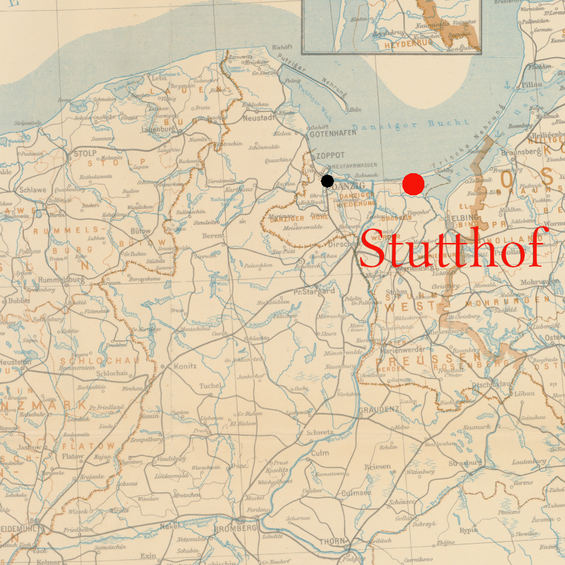Stutthof concentration camp
The following claimants were in the Stutthof concentration camp and its subcamps:
- Vera Aizenberg (September 1944 to October 1944),
- Jacob Charmac (August 1944 - October 1944),
- Shlomo Charmac (August 1944 - October 1944),
- Gitel Grilches (late summer 1944),
- Efraim Katz (late summer 1944)
- Lea Kochmann (March 1944 - September 1944)
- Herrmann Rubinoff (?? - October 1944)
- Josef Segalowicz (late summer 1944) , Burggraben(?), "Schiffsbucht Zichau" (Schichau shipyard?)
- Daniel Shumel (September 1944 - October 1944)
Herman Rubinoff
From Kibioli they were again transported to Reval (note: Talinn) in four-day transports under the same conditions. There they were loaded onto a boat and travelled via Gdansk to Stutthof.
During their six-week stay there, they were given almost nothing to eat. They had to do extremely hard forestry work, were constantly beaten and many camp inmates were killed. At the end of the six weeks, Kl. and his brother reported for work in Germany in October 1944. They were sent to the Dautmergen concentration camp near Balingen in Wuerttemberg with a transport of about 1000 Jews.
Source: Expert report by H. Pineas, 1969
Gittl Grilches, geb. Friedberg
From there I was taken by ship to the Stutthof concentration camp in the late summer of 1944.- I only stayed there for 3 weeks in the transit camp and was then transferred to the LANGFUHR b/Danzig camp in closed cattle wagons at the end of January 1945.- I was housed in a wooden barrack behind barbed wire and was closely guarded by SS women and men. My camp commandant was SS woman Margarete.- I worked under duress at the railway station with the transport.- At the beginning of March 1945 I was evacuated from the camp on foot to an unspecified destination.- On the way I was liberated near Chinow in March 1945.-
Source: Affidavit
Josef Segalowicz
From there I was sent to Stutthof concentration camp together with Josef Segalowicz and after a while we were transferred from there to Burggraben camp, which was about 30 kilometres from Gdansk. I stayed in this camp together with Josef Segalowicz for almost six months. I can't say today how long we stayed in each camp. From Burggraben I was sent again, together with Josef Segalowicz, to the Riben (or Riwen, author's note) camp, where we were liberated by the Russian army. After we had regained our strength with the improvement of our diet, I was assigned to the Russian army and sent to the front to fight against the Germans.
Testimony of Israel Widucki, 1972
We were sent from the camp in Stutthof, i.e. myself and Segalowicz, to the camp in Burggraben near Danzig. From the camp in Burggraben, we travelled to work every day in Gdansk, to the "Schichawerke" factory; these were shipyards where submarines were built. We worked there for about six months. When the Russian army approached, the Germans drove us out and took us westwards. On the way, the Germans separated us from each other; since then I have separated from Segalowicz and only met him again after I arrived in the country.
Testimony of Chaim Srolowicz, 1972
Lea Kochmann
They demanded slave labour from me under the most miserable conditions. I was beaten every day. I was often starving. We were made to work in all seasons. It was particularly terrible in Stutthof, where I was forced to pick up the dead and bury them. I often wished I was dead myself back then.
Source: affidavit
